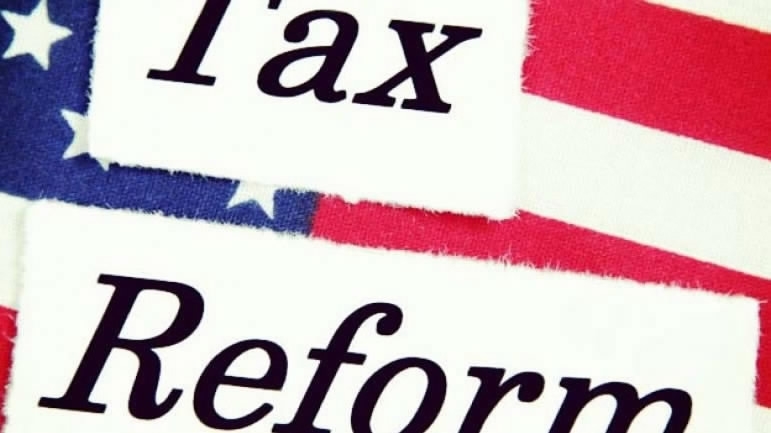
Editor's note: James Rae, a professor at California State University Sacramento, was a Fulbright Scholar at Beijing Foreign Studies University from 2017 to 2018. The article reflects the author's opinions and not necessarily the views of CGTN.
This week, 130 countries representing over 90 percent of global GDP agreed to a global taxation scheme that seeks to level the playing field among the world's diverse economies and prevent some countries from luring corporations to their shores with promises of tax relief. Some have lauded it as the most significant international tax deal in a century. Well, that is probably the case since taxation is fundamentally a national process and few if any common global accords exist related to domestic tax policies.
It is also unclear why one hundred years is used, since that harkens back to the laissez-faire era of free market capitalism of the early 20th century that largely preceded the growth of socialist welfare policies, even around the time the United States first adopted a domestic income tax. Aside from the typical overreaction in Western media to a relatively minor accomplishment, the agreement nevertheless represents some symbolic achievements and to a lesser degree tangible reform.
First, this agreement suggests a return back to multilateral decision-making in international affairs. Such a consensus would never have been possible under former U.S. President Donald Trump, even though it is designed to make a fairer global competition for richer countries like the United States in which to operate.
The new Joe Biden administration has signaled its commitment to repairing American relationships with particularly Western Europe and various international organizations. This gives evidence of the stated plan of the new American foreign policy team to seek global leadership but in a more diplomatic manner, at least on issues of social and economic concern.
Second, the agreement also reflects a changing attitude toward globalization and away from the Washington Consensus preference for neoliberal policy prescriptions that prioritized financial liberalization, privatization, and deregulation. As U.S. Federal Reserve Chair Janet Yellen remarked, the past decades have promoted a "race to the bottom" in the global economy. Now the last two American presidents have demonstrated a clear separation from neoliberal orthodoxy, propelled by the populism of Trump to the progressivism of Biden.
Third, the agreement also demonstrates the power of mutual interest in an interdependent world, where major G7 economies plus China, India, Russia, and others find common benefit in setting minimum taxation standards that should draw billions more revenue to the governments of all parties. Countries want businesses to pay their fair share of taxes, unless of course when they want to attract investment by offering a better deal.

As multinational corporations have become denationalized, particularly Western firms, loyalty to their host nation has frayed and state-business relations have deteriorated, particularly among technology and e-commerce firms. They are really the target here, with their amorphous business model providing services that transcend borders and create remote working environments, delivering goods across boundaries from distant outposts, and sometimes incorporating themselves in notorious tax havens of the Caribbean. It is thus not surprising that governments big and small around the world wish to pull the reigns a bit tighter on such behemoths.
However, does this accord tangibly impact such firms? The deal still needs further refinement and adoption at the G20 and through further specification, with a target to implement by 2023. Each constituent has domestic legislation to adopt, and that is no sure thing, particularly in the United States; while the European Union strives for consensus, at least three member states (Ireland, Estonia, and Hungary) did not sign deal and would have to forfeit their lower tax rates that fall below the 15 percent threshold (or allow other countries to tax the rest of the way up to 15 percent). International diplomacy on this scale, even with overwhelming support, can be treacherous; if one major economy backs out it could collapse.
Finally, this minimum corporate tax is still quite low, most major economies have rates well above this standard. The global average is around 25 percent (as it is in China), though down from about 40 percent in 1980, according to the American non-profit Tax Foundation. In 2017, the United States lowered its rate from 35 percent to 21 percent and aims this year to raise it to a median of 28 percent. Moreover, major corporations do not expect much impact on their bottom-line, perhaps shaving off a tiny fraction of earnings, and indeed the huge extractive industries and many financial services firms were granted exemptions.
Most importantly, all of these countries would need to develop some sort of information sharing infrastructure, or perhaps a sanctions regime, to compel participation. The temptation to cheat and offer a special low tax incentive (as the Celtic Tiger of Ireland has done to great success) will always loom; or purposefully lax enforcement by domestic agents of the state could trip up its goals. International law is extraordinarily hard to enforce in practice, even if setting the rules is no easy task either.
Nevertheless, this agreement is a significant first step toward a rules-based global corporate tax regime, and has veritable symbolic power as the world seeks to rehabilitate multilateral diplomacy in the wake of a pandemic and the rise of economic nationalism.
(If you want to contribute and have specific expertise, please contact us at opinions@cgtn.com.)

